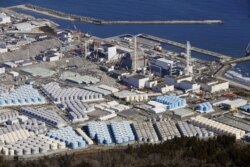South Korean President Moon Jae-in has ordered his Cabinet to consider filing a complaint with an international court against Japan’s decision to release radioactive water from the wrecked Fukushima nuclear power plant into the Pacific Ocean.
Presidential spokesman Kang Min-seok told reporters Wednesday in Seoul that President Moon wants officials to examine whether to bring the matter to the International Tribunal for the Law of the Sea.
Japanese Prime Minister Yoshihide Suga announced Tuesday that his government had approved a plan to empty 1.3 million tons of contaminated water from Fukushima into the ocean beginning next year, when the plant’s storage tanks will be full. Suga said the plan to release the water in the sea is an “unavoidable” part of decommissioning the Fukushima facility.
Moon also personally expressed his concerns about the plan Wednesday to Koichi Aiboshi, Japan’s envoy to South Korea, when Aiboshi formally presented his credentials. He told the ambassador the two countries are geographically close to each other and share the same sea.
Aiboshi was formally summoned to South Korea’s foreign ministry Tuesday to hear a formal protest about the plan.
The Fukushima Daiichi plant became inoperable after a 9.0-magnitude quake triggered a tsunami that swept across northeastern Japan before reaching Fukushima prefecture.
The high waves knocked out the plant’s power supply and cooling systems and led to a meltdown of its three reactors, sending massive amounts of radiation into the air and forcing the evacuation of hundreds of thousands of residents, making it the world’s worst nuclear disaster since the 1986 Chernobyl accident.
China has also criticized Tokyo’s plan for Fukushima, calling it “irresponsible."






